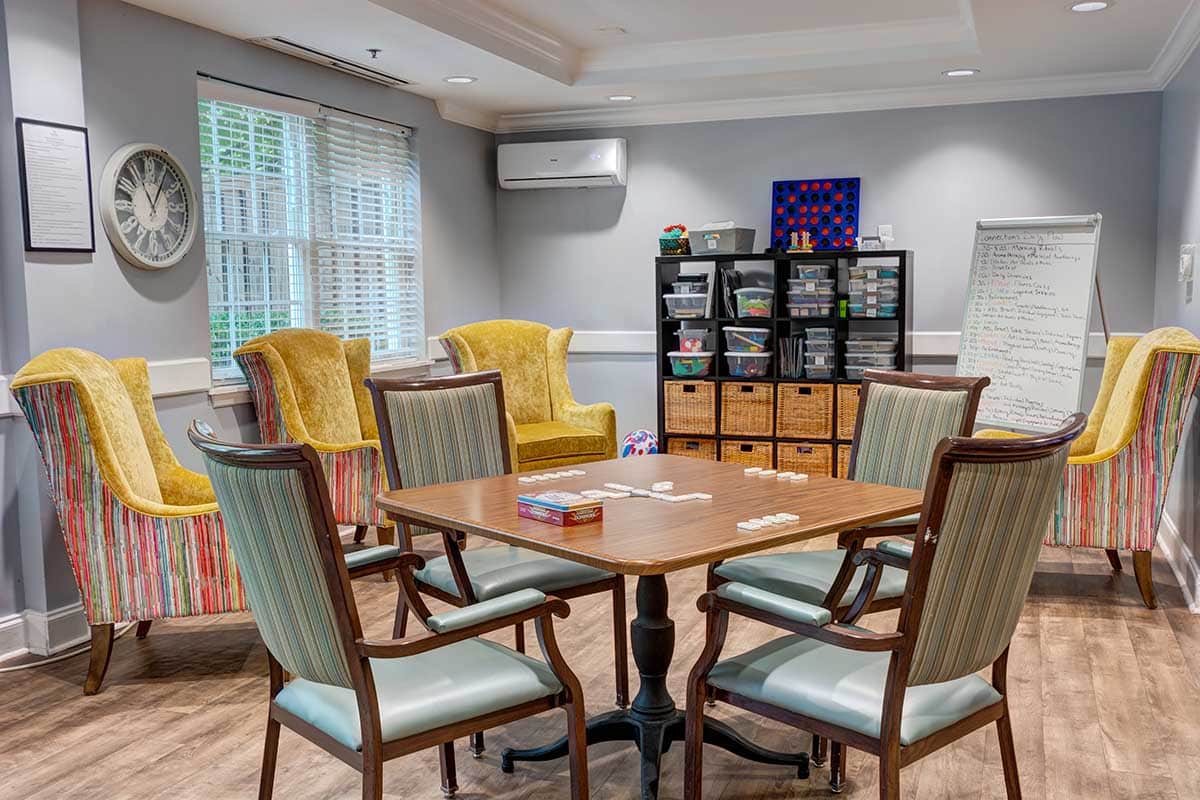All Regarding Memory Treatment Services: Why Little Memory Treatment Residences Are a Wonderful Choice
Memory treatment solutions play a vital function in supporting individuals with Alzheimer's and mental deterioration. Little memory care homes stand out for their personalized technique and intimate setting. With lower staff-to-resident ratios, these homes promote more powerful links and tailored treatment. Residents take advantage of enhanced social communications and a risk-free environment. As families discover choices, comprehending the special advantages of tiny memory treatment homes comes to be crucial. What aspects should be taken into consideration when selecting the appropriate home?
Comprehending Memory Care Provider
While many may know with general senior treatment alternatives, comprehending memory treatment solutions is essential for households dealing with the challenges of cognitive decline. Memory treatment especially caters to people with problems such as Alzheimer's disease and various other types of dementia. These services offer a structured setting that focuses on improving the high quality of life for residents via specialized care and support.Memory care centers are created to guarantee security and safety, usually featuring safeguarded environments to avoid roaming. Educated personnel are readily available around the clock to help with daily activities, drug administration, and individual treatment. Additionally, memory care programs typically consist of cognitive excitement activities, tailored to involve locals and advertise mental health. Family members can benefit from comprehending these services, as they make it possible for notified decisions regarding their enjoyed ones' treatment, making sure that their specific requirements and preferences are resolved in a caring and encouraging fashion.
The Advantages of Little Memory Treatment Houses
Small memory treatment homes supply unique advantages that can greatly improve the quality of life for locals with cognitive problems. One significant benefit is the intimate environment, which permits for personalized communications amongst personnel and citizens. This smaller sized setup fosters purposeful partnerships, reducing sensations of seclusion and stress and anxiety usually experienced by people with memory issues.Additionally, the reduced staff-to-resident proportion in tiny memory care homes enables caretakers to give even more mindful supervision and support. This strategy not only improves safety but additionally promotes a complacency for the residents.Moreover, tiny memory care homes can adapt promptly to the one-of-a-kind needs and choices of each resident, enabling a more homelike atmosphere. Such an atmosphere can urge social engagement and involvement in tasks, inevitably enhancing the daily experiences of those dealing with cognitive problems.
Personalized Care Program for Locals
Individualized care plans are crucial in memory treatment homes, as they deal with the one-of-a-kind needs and preferences of each resident. These plans start with detailed evaluations carried out by skilled specialists, that evaluate cognitive abilities, case history, and individual passions. This tailored strategy guarantees that care is not just efficient but additionally considerate of each individual's dignity and autonomy.Moreover, customized treatment plans are adaptable, permitting modifications as citizens' needs develop with time. This adaptability fosters a sense of safety and security and knowledge, which is essential for individuals dealing with memory obstacles. Caretakers are educated to implement these plans consistently, giving assistance that aligns with the locals' routines and preferences.Ultimately, individualized treatment strategies improve the lifestyle for homeowners by promoting freedom, interaction, and health, making them a basic element of memory care services in tiny memory treatment homes.
Creating a Home-Like Environment
Developing a home-like environment is crucial for cultivating convenience and familiarity in memory care setups, as it significantly influences homeowners' psychological health. Tiny memory treatment homes commonly prioritize customized touches, such as warm shade schemes, family members images, and acquainted furniture plans, which assist citizens feel a lot more secure. Incorporating aspects similar to a standard home, like cozy space and public locations, motivates a feeling of belonging.Moreover, using natural light and outside areas can enhance the environment, advertising relaxation and serenity. Personnel play a substantial duty in maintaining this setting by engaging with homeowners in a compassionate fashion, treating them like family members. Routine tasks, such as food preparation or gardening, can additionally add to a home-like feel, providing chances for locals to take part in purposeful experiences. Generally, developing a supporting atmosphere supports cognitive function and psychological stability, making it an essential element of memory treatment services.
Enhanced Social Communication and Community
Improved social interaction and community are essential parts of memory care solutions. By fostering customized social interaction and creating a family-like atmosphere, these services advertise significant links amongst residents. Team tasks and events better motivate engagement, assisting individuals really feel extra consisted of and supported.
Personalized Social Involvement
While social communication is vital for general well-being, many individuals with memory problems commonly struggle to involve meaningfully with others. Personalized social interaction in memory treatment homes addresses this difficulty by producing tailored tasks that cater to locals' distinct interests and abilities. By focusing on individual choices, caregivers can foster connections that resonate deeply with each individual. Activities such as art treatment, songs sessions, and led conversations promote cognitive excitement and psychological expression. Additionally, tiny team settings motivate camaraderie and enable even more intimate communications, boosting feelings of belonging. This approach not only deals with feelings of seclusion yet also equips citizens to preserve a sense of identification, eventually adding to boosted mental health and lifestyle.
Family-like Ambience
In a memory care setup, fostering a family-like ambience considerably boosts social communication and develops a sense of area among homeowners. Smaller memory treatment homes typically focus on intimate environments, enabling residents to develop closer links with one another and team member. This nurturing environment promotes depend on, which is important for people with memory problems. Homeowners are more probable to involve in conversations and share experiences, creating a supportive network that eases feelings of solitude. The familiarity of shared areas and regimens adds to a sense of belonging, better urging social interaction (personalized memory care). In such settings, psychological bonds flourish, bring about enhanced general wellness and a higher high quality of life for homeowners as they navigate their day-to-day experiences together
Group Activities and Events

Safety And Security and Security Attributes in Tiny Homes
Several little homes developed for memory care incorporate vital security and safety and security features to assure the health of homeowners. These homes commonly make use of safe and secure access and exit indicate avoid wandering, an usual worry among individuals with memory impairments. In addition, monitoring systems and alarm devices boost surveillance, making certain that team can immediately respond to any type of unusual activities.Interior layouts are tailored for safety and security, with lessened threats such as clutter-free paths and sharp corners. Handrails and non-slip flooring are typically set up to lower the threat of falls. Personnel are learnt emergency situation protocols, guaranteeing they are prepared for numerous situations.Moreover, customized see this page treatment plans might consist of assessment of private safety needs, offering customized remedies for each and every local. Generally, these safety and security functions develop a caring environment where citizens can grow while maintaining their dignity the original source and self-reliance.
Just how to Choose the Right Memory Treatment Home
How can families ensure they select one of the most ideal memory care home for their enjoyed ones? The decision calls for cautious factor to consider of numerous variables. Family members should evaluate the center's team certifications and training, making certain that caregivers are experienced in handling memory-related conditions. Next, it's important to analyze the home's environment, focusing on security functions and whether it fosters a feeling of area and belonging. Going to the center can provide insight into everyday tasks and the social ambience, which are vital for mental stimulation and psychological health. Furthermore, families ought to ask about the treatment plans used, guaranteeing they are tailored to specific requirements. Thinking about the home's location and accessibility for family members sees can contribute to a smoother shift. By addressing these facets, households can make an informed decision that prioritizes their liked one's comfort and quality of life in a memory treatment setup.
Frequently Asked Concerns
What Certifications Should Team Members in Memory Care Homes Have?
Employee in memory treatment homes must possess relevant certifications, experience in mental deterioration treatment, strong interaction abilities, and empathy. Recurring training in behavioral monitoring and restorative interventions improves their ability to sustain locals properly.
Exactly How Do Memory Treatment Services Differ From Standard Assisted Living?
Memory care solutions concentrate particularly on people with memory problems, supplying specific assistance and structured environments. In contrast, traditional assisted living supplies general aid with daily activities, doing not have the tailored technique required for those with cognitive obstacles.
What Types of Tasks Are Offered in Memory Care Homes?
Memory treatment homes usually supply a variety of activities created to involve locals. Typical alternatives include art treatment, songs sessions, cognitive video games, physical exercises, gardening, and get-togethers, all targeted at improving health and cognitive feature.
Can Homeowners Bring Their Own Items to Memory Care Residences?
Homeowners can typically bring their own personal belongings to memory treatment homes, permitting them to individualize their home - personalized memory care. This practice helps create a familiar environment, promoting convenience and a feeling of identity for the people

Exactly How Are Relative Entailed in the Treatment Refine?
Member of the family play an essential role in the care process, frequently taking part in decision-making, attending care meetings, and providing emotional assistance. Their participation cultivates a collective environment, improving the resident's general wellness and top quality of life. While numerous might be acquainted with basic elderly care choices, recognizing memory care services is vital for households facing the challenges of cognitive decrease. These solutions supply an organized setting that concentrates on improving the high quality of life for residents via specialized treatment and support.Memory care facilities are created to assure safety and security and safety and security, often including secured atmospheres to prevent straying. Customized care plans are essential in memory treatment homes, as they cater to the special requirements and preferences of each resident. Team participants in memory care homes should possess relevant accreditations, experience in dementia care, solid interaction abilities, and concern. Memory care solutions concentrate specifically on individuals with memory impairments, supplying specialized assistance and structured environments.